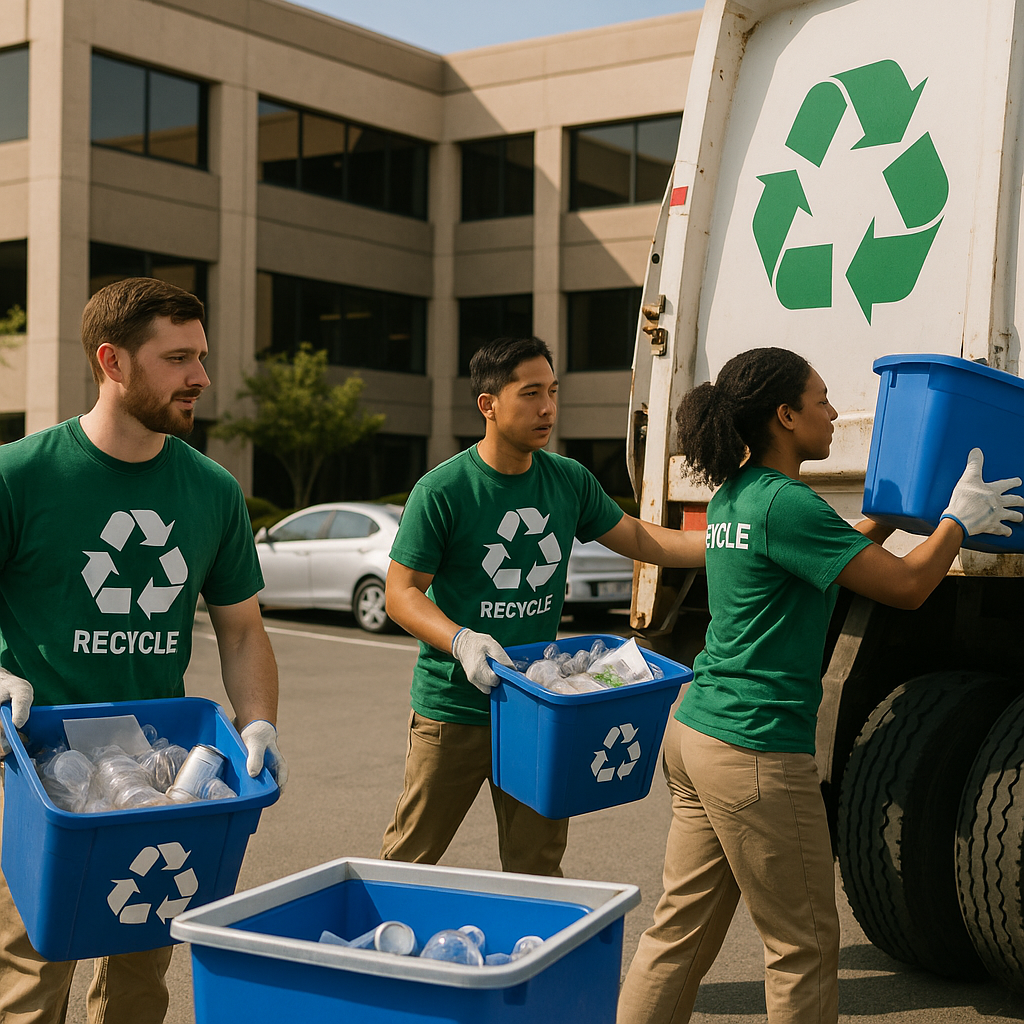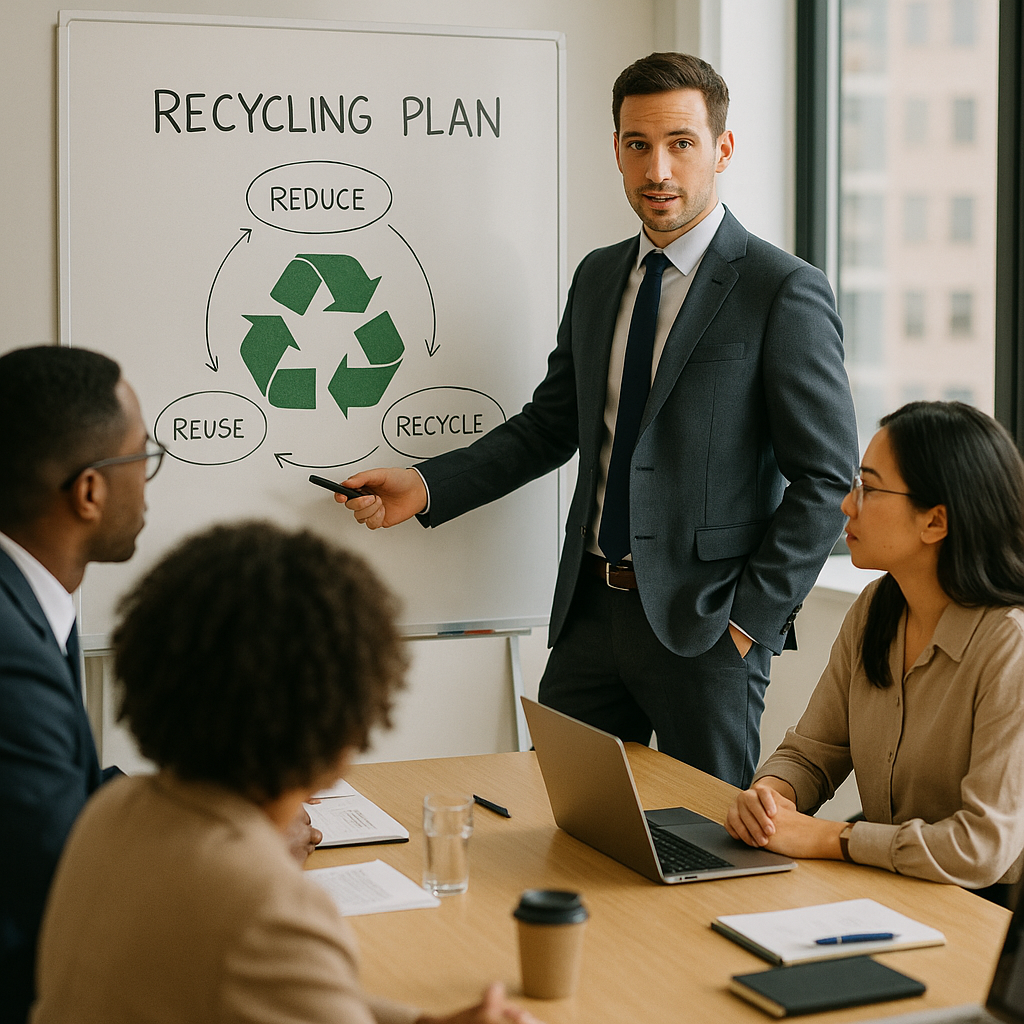5901 Botham Jean Blvd, Dallas, TX 75215
Office Recycling Services: How Workplaces Reduce Waste and Promote Sustainability
July 5, 2025Office recycling services offer businesses structured programs to efficiently collect, sort, and process recyclable materials generated in workplace environments. These specialized waste management solutions help divert items like paper, cardboard, plastics, and electronics from landfills through systematic collection and processing.
Businesses generate significant amounts of recyclable waste daily. According to the U.S. Environmental Protection Agency, the average office worker produces about 2 pounds of paper and paperboard products each day. Office recycling services address this issue by offering tailored collection systems, regular pickup schedules, and suitable processing methods for various waste streams.
These services typically include recycling bins placed strategically throughout offices, clear labeling systems to minimize contamination, scheduled collection by permitted haulers, and proper processing facilities that ensure materials are recycled. For businesses dealing with waste management regulations and sustainability goals, these services provide both compliance solutions and environmental benefits.
What Materials Can Be Recycled Through Office Services?
Office recycling programs accept a wide range of materials that would otherwise end up in landfills. Most office waste is recyclable, with the EPA estimating that up to 90% of waste produced by U.S. offices can be recycled instead of discarded as trash.
Office recycling services typically collect and process the following materials:
- Paper products: Office paper, newspapers, magazines, envelopes, and file folders
- Cardboard: Shipping boxes, packaging materials, and display boards
- Plastics: Water bottles, food containers, and packaging materials (usually types #1-7)
- Metals: Aluminum cans, food tins, and metal office supplies
- Glass: Bottles and jars
- Electronics: Computers, printers, phones, and other electronic devices
- Ink and toner cartridges: Printer supplies that can be refilled or properly disposed of
Many office recycling services provide specialized collection systems with color-coded or clearly labeled bins to ensure proper sorting at the source. This separation is crucial because contaminated recyclables often end up in landfills. When recyclable materials are mixed with food waste or non-recyclable items, entire batches may be rejected by processing facilities.
Beyond basic recycling, many services offer secure document destruction for confidential papers. This specialized service ensures sensitive information is destroyed before recycling the paper materials. These services typically provide locked collection containers and a certificate of destruction to comply with privacy regulations.
Proper sorting directly impacts the efficiency of the recycling process. When materials are correctly separated, they can be processed more quickly and with less energy, reducing the carbon footprint of the recycling process and ensuring more materials are recycled rather than diverted to landfills due to contamination.
| Material | Recycling Method | Processing Requirements |
|---|---|---|
| Paper Products | Recycling bins for paper products | Collected and separated; secure document destruction for confidential papers |
| Cardboard | Flatten and place in designated bins | Highly recyclable; needs to be free of contaminants |
| Plastics (Types #1-7) | Separate by type if possible; use clear labels | Needs sorting and cleaning to remove contaminants |
| Metals | Separate from non-metal waste | Must be cleaned and sorted; often infinitely recyclable |
| Glass | Dispose in designated bins | Sort by color when possible |
| Electronics | Secure e-waste recycling program | Remove data securely; comply with handling regulations |
| Ink and Toner Cartridges | Collection points for cartridges | Return to suppliers/recycling centers |
Most recycling service providers can customize their collection programs based on your office’s specific needs and waste profile. Understanding what materials your local recycling service accepts is the first step in establishing an effective office recycling program.
How Do Office Recycling Services Work?

Office recycling services operate through a structured process designed to simplify waste diversion for businesses. Most recycling companies start with a waste audit to assess the volume and types of waste your office produces. This evaluation helps identify recyclable materials specific to your workplace.
Following the analysis of your waste stream, recycling providers supply appropriately placed collection bins throughout your office. These bins are usually color-coded and clearly labeled with images and text to aid employees in sorting materials correctly. For paper-heavy offices, bins are strategically placed near printers and meeting rooms where paper waste is prevalent.
Collection is conducted on a regular pickup schedule tailored to your office’s waste volume. Small businesses might need weekly pickups, while larger operations may require multiple collections each week. Many recycling companies offer flexible scheduling to accommodate seasonal variations in waste generation.
Once collected, recyclables are taken to processing facilities where they are sorted, cleaned, and prepared for reuse. Advanced facilities utilize both manual and automated sorting technologies to distinguish different materials and remove contaminants.
Apart from basic collection services, many recycling companies provide comprehensive program support. This includes offering employee education sessions, clear signage for bins, and regular reports on diversion rates. Some providers also assist businesses in setting up centralized recycling stations to encourage employee participation.
Tracking and reporting are crucial components of office recycling services. Providers generally offer detailed waste diversion reports that help businesses evaluate their environmental impact and identify areas for improvement. These metrics are valuable for companies pursuing sustainability goals or environmental certifications.
For businesses with specialized waste needs, recycling companies often offer additional services for items like electronic waste, furniture, or confidential documents. These materials require specific handling processes to ensure both environmental compliance and data security.
The financial structure of recycling services varies by provider and region. While there is typically a service fee, many businesses find that effective recycling programs reduce overall waste management costs by decreasing the volume of material sent to landfills. In some regions with bottle deposit programs or valuable recyclables, businesses may even earn modest returns from their recycling efforts.
What Are the Benefits of Office Recycling Services?
Office recycling services offer significant advantages for businesses of all sizes. From direct cost savings to an enhanced corporate culture, a well-structured recycling program provides numerous opportunities for organizations to flourish while minimizing their environmental impact.
Cost Savings
The primary financial benefit for businesses implementing office recycling is cost reduction. Recycling programs can significantly lower waste management expenses in various ways.
Landfill fees are usually based on waste weight. By diverting recyclable materials from general waste, businesses can significantly reduce the volume sent to landfills, leading to lower disposal costs.
Many offices can save money by using centralized recycling stations instead of providing individual desk waste bins. This approach reduces the frequency of collections needed and lowers expenses related to bin liners and custodial time.
Environmental Impact
Office spaces generate significant waste. Without proper recycling practices, materials like paper, plastic, electronics, and food waste would end up in landfills.
Recycling diverts these materials away from landfills, where they could contribute to pollution through chemical leaching into soil and groundwater. The recycling process often consumes less energy than manufacturing products from raw materials.
Glass and metals are infinitely recyclable, making them especially valuable in a circular economy. Even though plastic recycling is more complex, it helps prevent unnecessary waste from accumulating in landfills or natural environments.
| Recycling | Diverts materials like paper, plastics, and electronics from landfills, minimizing environmental pollution and conserving resources. |
| Landfill | Materials end up in landfills, leading to space issues and potential contamination of soil and groundwater. |
| Energy Recovery (Incineration) | Burns waste to generate energy, can reduce waste volume but may produce emissions, reducing its environmental friendliness in comparison to recycling. |
| Mechanical Recycling | Processes recyclable materials back into similar products, generally having a lower environmental impact due to conserving energy and resources. |
| Feedstock Recycling | Converts waste back into raw materials; beneficial but less common due to higher costs and technological constraints. |
Corporate Social Responsibility
Modern consumers and clients increasingly prefer businesses that display environmental consciousness. Implementing a recycling program visibly demonstrates your commitment to sustainability.
Major corporations such as Microsoft, Google, and Unilever have implemented zero-waste initiatives. However, small and medium businesses often lead change in their communities by adopting comprehensive recycling programs.
The growing number of B Corporations worldwide—now exceeding 5,000—illustrates the business value of environmental responsibility. Waste reduction through recycling is a key component of certification for these companies recognized as forces for good.
Regulatory Compliance
Many municipalities require specific recycling practices for businesses. In cities like New York, commercial enterprises must manage their waste responsibly through private carters, including proper recycling of materials such as paper, cardboard, and magazines.
An organized recycling program ensures compliance with these regulations. Professional recycling services stay up to date with changing requirements and can provide documentation of proper waste management practices when needed.
Maintaining compliance helps businesses avoid potential fines and administrative issues associated with improper waste disposal.
Employee Engagement
Recycling programs foster a positive workplace culture by involving employees in meaningful sustainability initiatives. Staff members increasingly seek employers whose values align with their environmental concerns.
When employees participate in office recycling efforts, they feel empowered to make a difference. This engagement often extends beyond the workplace as staff members adopt improved recycling habits at home.
Sustainability initiatives like recycling positively impact recruitment and retention efforts. For many younger professionals, a company’s environmental stance can be a crucial factor when considering job opportunities.
Choosing an Office Recycling Service

Selecting the right recycling service for your office is a critical decision that affects both your environmental impact and operational efficiency. The provider you choose will influence how effectively your waste is managed and diverted from landfills.
Begin by thoroughly assessing your office’s specific waste needs. Track the types and volumes of materials your business generates regularly. This baseline information helps identify the recycling streams you’ll need and the appropriate collection frequency.
Evaluate Material Acceptance
Recycling services vary in the materials they accept. Some handle only basic recyclables like paper, cardboard, and plastic bottles, while others offer comprehensive programs that include electronics, batteries, or specialty plastics.
Request detailed information about the materials each provider accepts. This transparency is crucial for avoiding contamination and ensuring your waste is recycled. Some providers may offer separate streams for paper, plastic, glass, and organics, enabling better material recovery.
Consider whether the provider can accommodate any unique waste your office generates. Law firms may need secure document destruction; tech companies might require e-waste recycling; food service businesses benefit from composting programs.
Service Reliability and Flexibility
The best recycling partners demonstrate consistent reliability. They collect on schedule and communicate promptly about any service changes. Read reviews and ask for references from current clients to gauge dependability.
Look for providers offering flexible pickup schedules that align with your office’s needs. Your waste volume may fluctuate seasonally or during special projects. A good provider can handle these changes without excessive fees or disruptions.
Assess their responsiveness when issues arise. Can you easily request a same-day pickup if your recyclables are overflowing? Do they have dedicated customer service representatives who understand your account?
Environmental Credentials and Transparency
Strong environmental credentials distinguish exceptional recycling services. Ask potential providers about their sustainability practices and diversion rates. Reputable companies willingly share information about where materials go after collection.
Request facility tours to see their operations firsthand. This transparency builds trust and verifies their responsible handling of materials. Some providers even track materials throughout the recycling process.
Investigate whether the company holds relevant certifications or affiliations with industry organizations. These credentials demonstrate a commitment to environmental standards and best practices in waste management.
| Factor | Description |
|---|---|
| Evaluate Material Acceptance | Check which materials each provider accepts and if they offer specialized streams like electronics or organics. |
| Service Reliability and Flexibility | Look for providers with consistent collection schedules and adaptable services for varying waste volumes. |
| Environmental Credentials and Transparency | Ask for sustainability practices and diversion rates, and request facility tours for transparency. |
| Pricing Structure and Contract Terms | Compare flat rates versus variable pricing and review terms for flexibility. |
| Reporting and Education Support | Opt for services that provide detailed reporting and educational materials to maximize program success. |
Pricing Structure and Contract Terms
Compare pricing structures carefully. Some providers charge flat rates, while others use variable pricing based on waste volume or collection frequency. Request detailed breakdowns that include any potential additional fees or surcharges.
Review contract terms thoroughly before signing. Note cancellation policies, contract length, and any automatic renewal clauses. The most customer-friendly providers offer flexible terms without excessive penalties for changes.
Consider the value of additional services when evaluating costs. Providers offering waste audits, sustainability reporting, or employee education programs may command higher rates but deliver greater overall value.
Reporting and Education Support
Data-driven providers offer detailed reporting on your waste streams and diversion rates. These insights help track progress toward sustainability goals and identify opportunities for improvement.
Look for services that provide educational materials and training for your staff. Effective recycling depends on employee participation. Providers who offer ongoing education help maximize program success.
Some companies provide regular updates about changes in recycling markets or regulations. This communication helps your business stay compliant with evolving environmental requirements.
By thoroughly evaluating these factors, you can select a recycling service that aligns with your office’s specific needs and sustainability objectives. Take time to research multiple providers, conduct interviews, and check references before making your final decision.
Conclusion: Implementing Effective Office Recycling

Implementing an effective office recycling program is a strategic investment that yields substantial environmental and business benefits. We’ve discussed how thoughtful planning, proper infrastructure, and consistent employee engagement form the backbone of successful workplace recycling initiatives. From conducting waste audits to establishing dedicated Green Teams, these programs help organizations reduce their environmental footprint while potentially lowering waste management costs and strengthening their corporate image.
The journey toward a more sustainable workplace doesn’t end with setting up recycling bins. It requires ongoing evaluation, education, and adaptation to changing needs and recycling capabilities. The long-term benefits extend beyond waste diversion, including improved employee morale, an enhanced brand reputation, and a meaningful contribution to environmental conservation. For businesses aiming to improve sustainability practices and reduce environmental impact, contact Okon Recycling at 214-717-4083.
